#which is Jonas Kaufmann
Text
Jonathan Tetelman is a problem.
As in I’m contemplating driving into SF during Thanksgiving break to see him as Alfredo.
That level of problem.
#he’s like the hot younger brother of the hot dad in opera#which is Jonas Kaufmann#in case you haven’t been paying attention
1 note
·
View note
Text

Jonas and his two greatest loves--Tezier and the floor.
#jonas x floor#kaufmann x tezier#jonas kaufmann#ludovic tezier#fyi#pretty much the entire first half is la forza#which is as it should be#opera
15 notes
·
View notes
Text
The Top 40 Most Popular Operas, Part 1 (#1 through #10)
A quick guide for newcomers to the genre, with links to online video recordings of complete performances with English subtitles.
Mozart's Die Zauberflöte (The Magic Flute) (Wolfgang Amadeus Mozart)
The most frequently performed opera worldwide: Mozart's fascinating, philosophical fairy tale opera, which appeals to both children and adults.
San Francisco Opera, 2010 (Piotr Beczala, Dina Kuznetsoca, Christopher Maltman, Erika Miklosa, Georg Zeppenfeld; conducted by Donald Runnicles)
Verdi's La Traviata
Tragic romance with social commentary, based on Alexandre Dumas fils' novel The Lady of the Camellias, which was also the basis for the classic 1936 Greta Garbo film Camille.
Los Angeles Opera, 2006 (Renée Fleming, Rolando Villazon, Renato Bruson; conducted by James Conlon)
Bizet's Carmen
The fiery tragedy of a seductive, free-spirited Spanish Romani woman and her loves, with some of opera's most iconic music.
Royal Opera House, Covent Garden, 2006 (Anna Caterina Antonacci, Jonas Kaufmann, Ildebrando d'Arcancelo, Norah Ansellem; conducted by Antonio Pappano)
Puccini's La Bohéme
Relatable slice-of-life romance that blends comedy and tragedy. The inspiration for the popular musical RENT.
Studio film, 1965 (Mirella Freni, Gianni Raimondi, Rolando Panerai, Adriana Martino; conducted by Herbert von Karajan)
Mozart's Le Nozze di Figaro (The Marriage of Figaro)
The best loved of Mozart's Italian operas, a great comedy of class conflict and sexual intrigue.
Glyndebourne Festival Opera, 1994 (Gerald Finley, Alison Hagley, Renée Fleming, Andreas Schmidt, Marie-Ange Todorovich; conducted by Bernard Haitink)
Puccini's Tosca
Political intrigue, lust, and bloodshed amid the splendor of Rome – some call it a "shabby little shocker," others call it thrilling.
Vienna State Opera, 2019 (Sondra Radvanovsky, Piotr Beczala, Thomas Hampson; conducted by Marco Armiliato)
Mozart's Don Giovanni
Arguably the greatest retelling of the legend of Don Juan, with comedy, drama, and Mozart's glorious music.
Salzburg Festival, 1954 (Cesare Siepi, Otto Edelmann, Elisabeth Grümmer, Anton Dermota, Lisa della Casa, Erna Berger, Walter Berry Deszö Ernster; conducted by Wilhelm Furtwängler)
Puccini's Madama Butterfly
Puccini's iconic "Japanese tragedy." Controversial from a racial standpoint, but a tearjerker nonetheless, and the inspiration for the musical Miss Saigon.
Feature film, 1995 (Ying Huang, Richard Troxell, Ning Liang, Richard Cowan; conducted by James Conlon)
Rossini's Il Barbiere di Siviglia (The Barber of Seville)
The lighter and more madcap prequel to The Marriage of Figaro, known as the quintessential comic opera.
Vienna State Opera, 2019 (Rafael Fingerlos, Juan Diego Flórez, Margarita Gritskova, Paolo Rumetz, Sorin Coliban; conducted by Evelino Pidò)
Verdi's Rigoletto
A richly melodic tragedy of a hunchbacked jester, his daughter, a lecherous duke, and a self-fulfilling curse.
Studio film, 1982 (Ingvar Wixell, Luciano Pavarotti, Edita Gruberova; conducted by Riccardo Chailly)
#opera#top 40#part 1#top 10#video#complete performances#english subtitles#die zauberflöte#the magic flute#la traviata#carmen#la boheme#le nozze di figaro#the marriage of figaro#tosca#don giovanni#madama butterfly#il barbiere di siviglia#the barber of seville#rigoletto
110 notes
·
View notes
Note
You prefer it (pourquoi me réveiller) sung by which singer?
jonas kaufmann has my heart tbh
#opera tag#opera#asks#werther#massenet#jules massenet#tenors…#jonas kaufmann#opera asks#ask me anything
4 notes
·
View notes
Photo
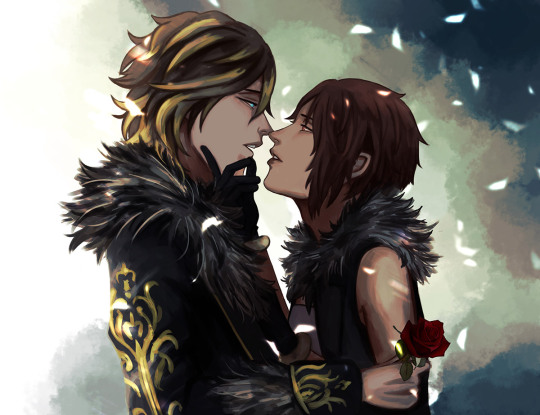
“Why did fate send you to cross my path?”
Shout out to Jonas Kaufmann’s "The Flower Song” performance in Act 2 with the final delivery of “Carmen, I love you” sung to the flower and not directly to Carmen herself which can be interpreted as Don Jose actually being in love with his perceived concept of Carmen over the real woman before him.
15 notes
·
View notes
Text
How many parts are there in a choir?

Parts of a Choir
The singers in choirs are grouped by their voice types and choral music is usually written with distinct lines or parts for some or all of these voice types. Voice types are typically organized into four groups. From highest vocal range to lowest, these include:
A soprano is a female singer with a high voice. Young boys who sing, and also girls, are usually called trebles. The word “soprano” can also refer to the top line of choir music. This would be sung by sopranos or trebles. Soprano is also used as a name for high pitched instruments, such as a soprano saxophone.
In opera there are different kinds of soprano voices:
A dramatic soprano will sing big, dramatic roles such as Aida in Verdi's opera Aida.
A coloratura soprano will have a light voice which can bounce up to very high notes (the Queen of the Night in Mozart’s Magic Flute goes up to top F (2 1⁄2 octaves above middle C).
A soubrette is usually the maid or a young girl who flirts.
A lyric soprano role needs a beautiful smooth voice, e.g. Mimi in Puccini's La Boheme.
A heavy dramatic soprano is needed in many of Wagner's operas, e.g. Isolde in Tristan und Isolde or Brunnhilde in Der Ring des Nibelungen.
In the 17th and 18th centuries many of the soprano roles were written for male sopranos. Called a castrato, they were men who had their testicles removed before puberty so that their voices would remain high pitched.
The word alto can mean:
someone who sings lower than a soprano. Usually females with lower voices are called contraltos. A male alto is a man who sings in a special way called falsetto. In England male altos sing in church and cathedral choirs. In some countries like Germany it is tradition to have boy altos in cathedral choirs. These will probably be boys whose voices will soon be breaking and are starting to get lower.
One of the most famous contraltos was Kathleen Ferrier. There are not so many female singers who call themselves contraltos these days. It has become more fashionable to be a mezzo-soprano. It is partly because it has become fashionable to use men for the alto parts in music by Bach and other Baroque composers, like it would have been performed in those days
A tenor is a man with a high singing voice. In opera the role of the young male is usually sung by a tenor. Depending on characteristics such as: volume, color and style, the tenor voice is classified in following groups:
The light tenor. This is also called tenor leggero. An example is Peter Pears, who sang the tenor solos in Benjamin Britten’s operas.
The lyric tenor. The lyric tenor is a tenor with a well timbered voice, such as "The Three Tenors" (Luciano Pavarotti, Jose Carreras and Plácido Domingo).
The spinto tenor. They have special abilities in the high tones, such as Franco Corelli and Enrico Caruso.
The dramatic tenor. They have a high volume and a dark voice. An example is Mario Del Monaco.
A “Heldentenor” (German for “hero tenor”) is someone with a big tenor voice. This is suitable for heroic parts like the heroes in most of Wagner's operas. Lauritz Melchior, Max Lorenz and Jonas Kaufmann are famous heroic tenors.
A bass is a type of male singing voice and possesses the lowest vocal range of all voice types. According to The New Grove Dictionary of Opera, a bass is typically classified as having a range extending from around the second E below middle C to the E above middle C (i.e., E2–E4).[1] Its tessitura, or comfortable range, is normally defined by the outermost lines of the bass clef.
ChorSymphonica is a project-based ensemble. We don’t meet on a regular basis for rehearsals, but come together for brief, intense work periods (“projects”), which culminate in performances. Musicians self-select for projects, depending on their own availability. In this way we can draw upon the range of qualified musicians throughout the region for our concerts.
To know more Visit: https://chorsymphonica.org/who-we-are/
1 note
·
View note
Note
I would say you're about a 3 for intimidation as well. You have some intimidating specialized knowledge, but you seem like a very nice person. And it's hard to be intimidated by someone who looked at all the potential Special Boys in Pathologic and picked Vlad Jr. off the shelf. /affectionate
THANK YOU vlad jr. is truly the least special of my special little princesses that i have gathered in everybody's eyes but mine. (but it also means very little competition for the role of Supreme Vlad Jr. Liker.)
also i would say that the specialised knowledge shouldn't be intimidating (which, to be fair, it shouldn't! opera is, or should be, very much for everybody and this is something that i could write an entire essay about) but like. i am also moderately self-aware about that. and not necessarily above leaning on it when i am in Situations.
(opera is, essentially, a fight between the most pretentious people. and in order to win, i have to be the MOST pretentious.)
#ask#inkpot-demigod#ollie considers#what is your song o?#i am currently talking about repo for some reason so:#part of what i like about repo is that it does actually get the feel of Going To The Opera flawlessly#like... yes the orchestra seats are very much full of people wearing suits that cost more than i earn in a year#but also if you're up at the back you may encounter. like.#students and understudies learning the roles#or a granny who you chat to in the interval and find out about how she first saw don giovanni in the 60s!#(or two grannies who immediately clock you as gay and have a conversation about how jonas kaufmann is handsome.)#(fond memory that one)#like. Opera Is Very Much For Everybody#which repo is the only media to understand
2 notes
·
View notes
Video
youtube
GAAAAAAAAAAAAAH *ugly sobbing*
#this song is perfect for the violin#i'm quite fine that it's stuck in my head#also HAAAA I can't get jonas kaufmann's 'pourquoi me Riiiieeeeeeeveiller' pronunciation out of my head which is a bit more of a problem
9 notes
·
View notes
Text
Wish opera playlists on spotify had some singers who weren't Renee Fleming, Maria Callas, and Pavarotti 😔
#i say this like my personal opera playlist isn't a full 40% just phillipe jarrousky and montserrat caballé#ok thats exaggeration but so is saying Fleming Pavarotti and Callas are the only singers other people use so im embracing it#if u see me adding like an hours worth of jonas kaufmann no you dont#disgruntled octopus#opera tag#which isnt even to say theyre bad obv like they're so well known bc they were so good but like... they arent my style
2 notes
·
View notes
Video
youtube
#die schöne müllerin#schubert#jonas kaufmann#looks like it's lied day over here at chez lessthansix#also i am wildly entertained by that image#which is possibly why i have chosen this particular version#to inflict upon you all#‘man laughing alone with wanderer above the sea of fog’#music
16 notes
·
View notes
Text
The part that made me scream a little: "[T]here are some [roles] that fell by the wayside in the early part of my career train journey, like ‘Un ballo in maschera,’ which I never did and I think I should do."
Yes. Yes, you should.
4 notes
·
View notes
Note
Where do you watch operas?
There are plenty of complete filmed opera performances available on YouTube, which you can watch for free. Unfortunately, not all of them have English subtitles, but if necessary, you can always find a translation of the libretto online to follow along with.
In fact, just for fun, as an example, I'll provide some links to complete filmed performances of the world's top 10 most popular operas, with English subtitles.
Die Zauberflöte (The Magic Flute)
Studio film, 1971 (Nicolai Gedda, Edith Mathis, William Workman, Christina Deutekom, Hans Sotin; directed by Sir Peter Ustinov; conducted by Horst Stein)
La Traviata
Studio film, 1968 (Anna Moffo, Franco Bonisolli, Gino Bechi; directed by Mario Lanfranchi; conducted by Giuseppe Patané)
Carmen
Royal Opera House, Covent Garden, 2006 (Anna Caterina Antonacci, Jonas Kaufmann, Ildebrando d'Arcangelo, Norah Ansellem; staged by Francesca Zambello; conducted by Antonio Pappano)
La Bohéme
Studio film, 1965 (Mirella Freni, Gianni Raimondi, Rolando Panerai, Adriana Martino; directed by Franco Zeffirelli; conducted by Herbert von Karajan)
Le Nozze di Figaro (The Marriage of Figaro)
Teatro alla Scala, 2006 (Ildebrando d'Arcangelo, Diana Damrau, Marcella Orsatti Talamanca, Pietro Spagnoli, Monica Bacelli; staged by Giorgio Strehler; conducted by Gérard Korsten)
Tosca
Teatro Real de Madrid, 2004 (Daniela Dessí, Fabio Armiliato, Ruggero Raimondi; staged by Nuria Espert; conducted by Maurizio Benini)
Madama Butterfly
Theatrical film, 1995 (Ying Huang, Richard Troxell, Ning Liang, Richard Cowan; directed by Frédéric Mitterand; conducted by James Conlon)
Don Giovanni
Zurich Opera, 2001 (Rodney Gilfry, László Polgár, Isabel Rey, Cecilia Bartoli, Liliana Nikiteanu, Roberto Saccá, Oliver Wimer, Matti Salminen; staged by Jürgen Flimm; conducted by Nikolaus Harnoncourt)
Il Barbiere di Siviglia (The Barber of Seville)
Metropolitan Opera, 2007 (Peter Mattei, Juan Diego Florez, Joyce diDonato, John Del Carlo, John Relyea; staged by Bartlett Sher; conducted by Maurizio Benini)
Act I, Act II
Rigoletto
Studio film, 1982 (Ingvar Wixell, Luciano Pavarotti, Edita Gruberova; directed by Jean-Pierre Ponnelle; conducted by Riccardo Chailly)
#opera#complete performance#die zauberflöte#the magic flute#la traviata#carmen#la boheme#le nozze di figaro#the marriage of figaro#tosca#madama butterfly#don giovanni#il barbiere di siviglia#the barber of seville#rigoletto#english subtitles#youtube
370 notes
·
View notes
Note
What is the line between musical and opera? Are there any operas that have spoken lines in them? Is... is Into The Woods An Opera?? Help
Hey! Welcome, anon! Here’s the thing re: your first question: no one can really agree what that line actually is.
This is partly because YES! A lot of operas DO have spoken dialogue! The quick version:
you have singspiels, which are German operas with spoken dialogue. two of the most famous ones that immediately come to mind are Mozart’s Die Zauberflöte (The Magic Flute) and Weber’s Der Freischütz (The Freeshooter).
you have opéra-comiques, which are like singspiels but French. among the most famous examples of this are Bizet’s Carmen (the original version, because it is common for Carmen productions to sing the spoken dialogue instead) and Donizetti’s La fille du régiment (The Daughter of the Regiment).
*there’s also a subgenre called opéra-bouffe and while 3 AM Me cannot tell you what, if anything, is the big difference aside from name. Emmanuel Chabrier’s L’Étoile (The Star) is a great example.
there’s (British) light opera, as personified by the works of Gilbert and Sullivan. people disagree a lot as to whether or not these are even operas at all (some say they’re operettas—see below), and this tends to be a really sensitive subject for some reason. I don’t know. it feels a bit elitist to me tbh. I’ve loved Gilbert and Sullivan since 2015, so yeah.
then there are lots of other random operas that just happen to have spoken dialogue or speeches at different points for different reasons. the 3 that immediately come to mind here (please forgive me, it’s 3 AM) are Verdi’s Macbeth and La traviata (in both cases, to depict people reading letters aloud) and Bartók’s Bluebeard’s Castle, in which there is a spoken prologue that’s really creepy and cool.
and then you get to operetta, which is where all the confusion happens. the two main brands of operetta are French and German/Austrian. now what’s the difference between operetta and opéra-comique or singspiel? it’s partly time period (operetta started in the mid-1850s and was very popular through about the 1930s) and partly just people calling their works operettas. what’s the line between operetta and musical? not much, actually!!!
for instance, Franz Lehár’s Die lustige Witwe (The Merry Widow) premiered in 1905 as a German operetta, but it then opened on Broadway not too long after that and was so successful that it immediately became a marketing trend. you’ve ever heard of the Merry Widow hats or corsets? it comes from that.
French operettas are a lot of fun. Jacques Offenbach literally made the genre and his are must-sees, particularly Orphée aux enfers (Orpheus in the Underworld), La belle Hélène (The Beautiful Helen), and La vie parisienne (The Parisian Life). Hervé is also a good composer of French operettas, although I’ve only seen Mam’zelle Nitouche (but it’s a RIOT).
German operettas are a lot of fun too. The two most famous ones are the already-mentioned Die lustige Witwe and Johann Strauss II’s Die Fledermaus (The Bat). Strauss II and Lehár both wrote others, though, and there are lots of other ones out there too. (If you want small previews, there is a delightful album called Wien with tenor Jonas Kaufmann and soprano Rachel Willis-Sørensen that has excerpts from both Witwe and Fledermaus as well as several other German/Austrian operettas.)
Now, as to your last question, the man himself Stephen Sondheim said in 2016: “An opera is something done in front of an opera audience in an opera house. A musical play, or musical comedy, is something done on either a Broadway or off-Broadway stage before a musical theater audience.” So according to that definition, the answer would be no. However, I don’t think that definition is completely accurate, particularly because there is at least one case of a full-blown opera without significant spoken dialogue being performed on Broadway (Baz Luhrmann directing Giacomo Puccini’s La bohème—incidentally enough, the opera on which Rent is based—on Broadway in 2002).
So I think the answer simply has to be authorial intent and conception: do the composer and librettist(s) think they’re writing an opera, an operetta, or a musical? and that’s really what you have to go by. so to answer your last question: no, Into the Woods is not an opera because that is not what the creators thought of it as.
anyway, sorry if that got really confusing and long-winded. this is naturally a very confusing and complicated subject and I’ve tried to break it down as much as I-Woke-Up-At-3-AM-Me can. if you have any follow-up questions, dear anon, or really any questions at all, please do not hesitate to send them to me or anyone else on Operablr! we’re all lovely people, I promise.
#opera#opera tag#operetta#musicals#spoken dialogue#the hard and necessary questions#there’s so much gray area here really#authorial intent
20 notes
·
View notes
Text
Opera ask games day 6 & 7!
(Super late!)
Any favorite weird/funny lyrics?
This bit from Ballo never fails to make me LOL, Gustavo: “O ciel, lo sposo suo!”.
What are some opera songs that make you lose your mind?
Lucia: Chi mi frena (the iconic sextet); Onegin: final scene; Hamlet: Ô mortelle offense! (when Hamlet drenching himself in red wine); Ballo: Il messaggio entri (the quintet is a total bop); Don Carlo: Ella giammai m’amò (THAT cello solo intro); Prince Igor: Polovtsian Dances.
Are there any Met interview moments that live rent-free in your mind?
Not really interviews but, Alagna doing a backward-roll and Hvorostovsky asking for Fleming's approval to go for it.
What's an opera production that you positively rant about for an hour and a production that you could angry rant about for an hour
Positive: Onegin (2007), with the passion of seven blazing suns
Negative: tbh, I'll just ignore any productions that are still okay with black/brown/yellow-face and cultural appropriation.
Are there any weirdly specific moments from a stream/production that you love?
Hamlet (2010): a standard baritone overreaction / Don Carlo (2010): Rodrigo stroking Carlo's hair / Ernani (2012): Carlo V being dramatic
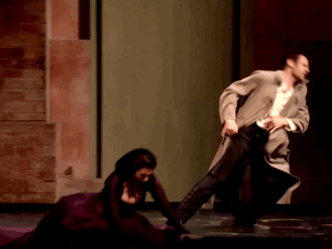
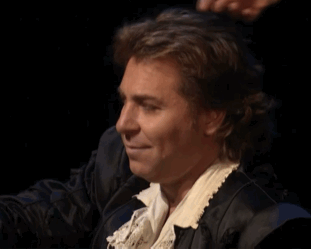
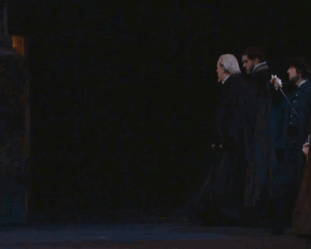
Le Comte Ory (2011): "Moi?" / Agrippina (2020): Nero doing some exercise on stage / La Bohème (2008): respect my modesty!
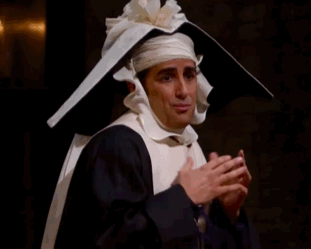
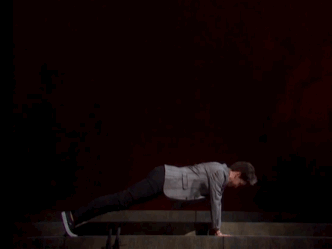

Which opera production was the most visually pleasing to you?
Off the top of my head: Prince Igor (2014), Eugene Onegin (2007), Cendrillon (2018), and Parsifal (2013).
Is there any singer who changed your opinion on an opera character?
I think it'd be Jonas Kaufmann and Werther. I'd not been a big fan of his voice for a long time and the opera was too gloomy for my preference. Then I finally got to watch his Werther last year. The dark tone in Kaufmann's voice actually suits the melancholic mood of Werther and the nuanced acting brings a lot more depth to the character. His rendition of Pourquoi me réveiller is such a powerful depiction of sorrow and despair. By the end of the opera, my perception changed... and I was all tears.
Are there any productions you wish had been filmed but are only available in audio form (or not available at all)?
Remember when the Met decided not to film THIS Boccanegra?
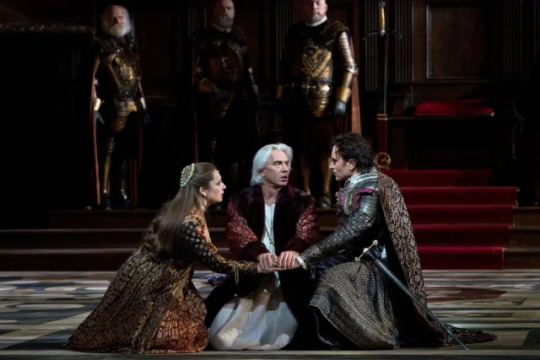
A singer that pleasantly surprised you in a role?
Roberto Alagna in La Rondine and Carmen. I didn't really care for his voice back then, just like Kaufmann's. But his willingness to throw himself into his performance has given me a newfound appreciation of him. This man also only cried real tears on stage.
Any costume(s) that you would want to have? (+pictures if you have them!)
My costume tag really comes in handy for this question :)
Opera characters that are meant for each other and you will not hear otherwise?
Charlotte & Werther, Tosca & Cavaradossi, Tristan & Isolde, Marcello & Musseta, Susanna & Figaro, and Carlo & Rodrigo.
Opera singer that you can’t dissociate from a certain role?
Probably, Radvanovsky's Elizabeth in Devereux. I don't know if there're any still-active sopranos out there that could ever be vocally and histrionically better than her 2016 portrayal.
Opera you think is a complete masterpiece from first to last note? (or an opera that you know by heart?)
Don Carlo(s), Eugene Onegin, La Traviata, La Bohème, Lucia di Lammermoor, Un Ballo in Maschera, Tosca, Il Trovatore, Norma, and Thaïs.
Favorite conductors/conducting moments?
Fabio Luisi goes from 0 to 100 at the beginning of Act 3 of Ballo:
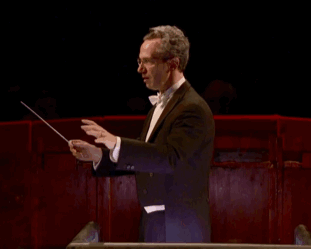
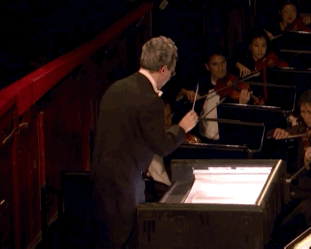
A unique acting choice that you cannot stop thinking about?
2017 Onegin offering Lensky his half-eaten baguette before the duel.
Battle of the productions: for an opera that was streamed in many different productions, which production do you think is the best (or do you like them all equally)?
Eugene Onegin: 2007 >>> 2013 > 2017
La Bohème: 2008 >> 2018
La Traviata: 2012 > 2017 >> 2018
Violetta/Alfredo chemistry: 2017 > 2012
Il Trovatore: 2011 > 2015
Thank you for tagging me, @opera-my-beloved xoxo
13 notes
·
View notes
Text
Wagnerrant Review #4 - Mishaps and Emotion
Work: Tannhäuser
House: Bayerische Staatsoper
Date of performance: 11.07.2021
Team
Director: Romeo Castellucci
Conductor: Asher Fish
With: Georg Zeppenfeld, Klaus Florian Vogt, Simon Keenlyside, Dean Power, Andreas Bauer Kanabas, Ulrich Heß, Martin Snell, Lise Davidsen, Elena Pankratova, Sarah Gilford, Soloists of the Tölzer Knabenchor
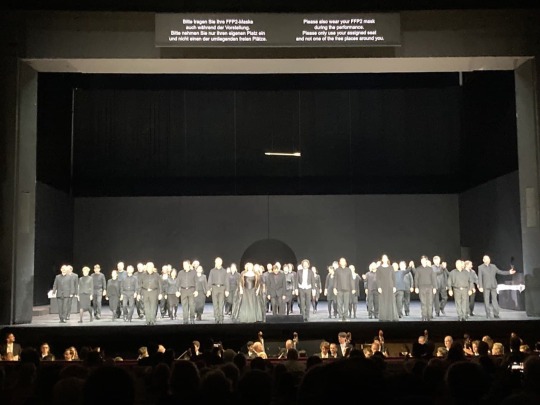
Review: @dichterfuerstin
With Jonas Kaufmann’s Tristan debut right next to Anja Harteros’ Isolde debut (Watch the stream on staatsoper.tv, July 31st, 5PM CEST, it’s worth it), it’s hard to believe that the event I was looking forward to the most in the 2020/21 opera season was a performance of a four-year-old production that I’ve seen online before. But it was and so I did everything to get my hands on tickets for this season’s only performance of Tannhäuser at Bayerische Staatsoper. I cannot describe how happy I was when I got them and how sad I am now that it’s over. I hope that writing this review will help me revive those five hours at Bayerische Staatsoper – truly a special evening.
The best part of the entire production is the opening scene. Romeo Castellucci uses the fairly long overture and Venusberg music to visualise Tannhäuser being lured to Venus. A group of topless woman shoots arrows at a picture of a human eye, later the picture changes to that of a human ear, bewitching Tannhäuser’s senses until he gives in. A Tannhäuser-double walks on stage and climbs up the backdrop.
This entire scene is choreographed flawlessly, every arrow compliments the music, and their placement on the backdrop is planned in a way where it works both for the picture of the eye and for the ear.
Castellucci did everything himself in this 2017 production of Tannhäuser. He directed, designed the sets, the costumes, and even the lighting. Solely the choreography by Cindy van Acker isn't his work. The result is a stunning unity of visuals on stage.
It’s those that tell the story, not the characters. Elena Pankratova, who returned to the production to replace Daniela Sindram, pretty much only had to sit around as Venus, but she doesn’t have to move. It’s the mountain of flesh she’s sitting in, and the fact that both her and her lovers seem to melt away in fat and skin, that explains to the audience that Venus is a personification of both Lust and Gluttony.
In act two, the singers could just stand in the wings to sing their lines. Not their acting tells us how they define love, but a single word written on a cube serving as altar and speaker’s desk at the same time. When Tannhäuser finally bursts out the confession that he’s been with Venus the words disappear and instead black colour gets spray-painted around in the cube. The black, forbidden aspect of Tannhäuser’s soul.
The entire production gradually becomes blacker. While act one is even fairly colourful – fleshy pink for Venus, and bloody red for the Wartburg-knights’ costumes the deer they’re hunting, act two is white with only implied skin and nudity, though a lot of it, and act three is black until the curtain-call.
This third act is the most impactful part of Castellucci’s production. It doesn’t raise nearly as much questions as act one and two – why do the knight’s costumes look like BDSM-fetish outfits? Why are there feet all over the stage during the Sängerkrieg? It shows the passage of time in the most impactful way. While more and more ridiculous numbers appear on the black screen – millions and millions and millions of year pass, the audience is shown the process of corpses rotting. And it’s not Tannhäuser’s and Elisabeth’s corpses, the names on the graves are those of the singers – Klaus and Lise. The message of this image? Tannhäuser and Elisabeth can’t be together in this timeline, but their story surpasses their lifetime.
But no matter how powerful the imagery: Once again the singers do pretty much just stand and sit around while the stage speaks for them. Thus they can’t convince through their acting choices, but have to put everything into their voices.
And they do. Especially Georg Zeppenfeld convinces as Landgraf Hermann. He is probably the most reliable singer of our time, he doesn’t seem to have off-days. And as always he’s at his best in this performance. His voice carrying easily through the performance and singing a dignified, powerful Landgraf. And no matter what happens, he always remains calm.
The opposite of calm is obviously Tannhäuser. Klaus Florian Vogt debuted the role in this back in 2017 and hasn’t been replaced for even one year ever since. With good reason: His unusually light voice is a perfect fit for the sometimes too self-assured, sometimes insecure Tannhäuser. In addition to this, Vogt noticeably puts his whole soul into his performance, even though he apparently did not have the time to fully revise his, which led to a kind of sad “In ihr liegt in Maria” instead of the famous “Mein Heil liegt in Maria” and other mishaps. He makes up for his mess-ups by making his Tannhäuser especially emotional. He’s not afraid of letting a character’s emotions influence the sound and spices up the Romerzählung by singing with a different voice when quoting the pope, in comparison to when he’s just Tannhäuser.
Lise Davidsen as Elisabeth is equally impressive. Having heard her as Sieglinde just some weeks before, I remembered her sometimes not being loud enough to get over a Wagnerian orchestra. This time however, she was in perfect form and every single one of her notes reached the audience, even the more quiet and scared lines in act three. I loved those especially. Davidsen dares to give her Elisabeth an insecure, questioning tone for “Sie sind’s” and “Sie kehren heim” and thus makes the audience really understand how much she fears Tannhäuser not coming back.
With their voices harmonizing perfectly, with their acting skills, their creativity and emotion, Davidsen and Vogt make a great duo and we can only hope to hear them together in many more productions – next up is Die Walküre in Bayreuth.
The most impressive performance, however, delivers Simon Keenlyside as Wolfram von Eschenbach.
Stepping in for another singer with just one day’s notice is hard, especially if this singer is Christian Gerhaher, munich’s favourite baritone. But Keenlyside, most well-known for his Mozart-interpretations mastered his unexpected Wagner-Challenge with ease. He acted as if he’d been rehearsing the production for weeks, and his big voice filled the Nationaltheater with ease, while always embracing Wolfram’s character. Not once he slipped into just singing his lines. Of course one could criticise that he never seemed to keep his hands still, unusual, when you’re used to Gerhaher’s interpretation of Wolfram von Eschenbach, but let’s be honest: This would be nothing more than beckmessering.
Keenlyside is not the only one stepping in, though the others had about two weeks to prepare for their roles. Elena Pankratova, returning as Venus for Daniela Sindram, who was supposed to take over the role this season, and like Zeppenfeld and Vogt an original cast member in Castellucci’s production sings, as if she had planned to come back to Venus, her strong Soprano outshines the unflattering costume her director gave her.
Last but not least, Asher Fish conducted the performance for Simone Young. While it would have been nice to see a female conductor for diversity’s sake, opera is a world still very much dominated by men, one cannot complain about Fish’s conducting. He works out orchestra parts that are hardly noticeable, sometimes works them out too much, like when Tannhäuser is discovered by the Wartburg-society in act one he pronounces the more rhythmic parts so hard the music ends up sounding like traditional dance music you’d expect at German fairs. But just like Vogt seems to have finally found his libretto in act two, the conducting gets more balanced and with sensible dynamic- and tempo choices Fish gives the opera the amount of tragedy and sadness it needs, together with the mixture of euphoria and anger Tannhäuser’s descriptions of love in act two need.
Even if not everything went well – the choir could have been more balanced, the very first set change in act didn’t go as smoothly as it’s supposed to go, and not everyone knew their lines – the performance was touching, very nice to see, and fantastic to hear. I’m so glad to have been there, and cast and crew deserved all of the applause they got – certainly more than ten minutes of clapping and cheering.
6 notes
·
View notes
Text
1) excited for several of these! They're doing Cendrillon!!!! and my favorite Hansel and Gretel!!!
2) remember that post I wrote a while back about ideas for theme weeks? Pretty sure the Met read it and is using all my ideas because they've done at least 3 of them so far.
3) how dare the Met show their Faust so soon after the Paris one do they KNOW what this is going to do to me
#every time I'm like 'we can never not watch the Met Faust :)' but idk i may have to skip it this time around#or maybe itll help me recover??#who knows#it will have been over a week by then so i should be over it but you know me#anyway#met opera streams#some good stuff coming our way
8 notes
·
View notes